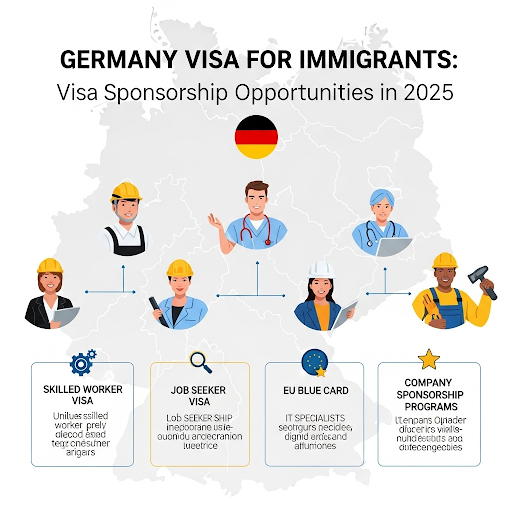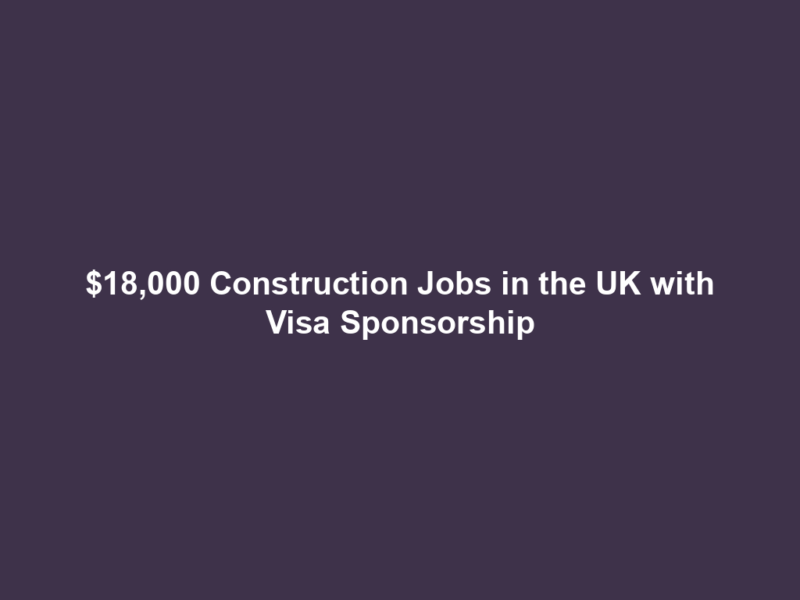Planning to work abroad in 2025? Germany might be your smartest move yet. As Europe’s economic engine with a GDP of over €4.18 trillion, Germany continues to dominate the global job market and stands as one of the most attractive destinations for foreign professionals seeking visa-sponsored jobs, career growth, and permanent residency.
In 2025, Germany faces an urgent labour shortage of over 200,000 skilled workers, driving demand in critical industries such as healthcare, information technology, engineering, and skilled trades.
To meet this gap, the German government has enhanced its immigration system, making it easier for non-EU professionals from countries like India, Pakistan, the Philippines, and beyond to gain legal entry through visa sponsorship programs.
Pathways such as the EU Blue Card, Skilled Worker Visa, and the newly introduced Opportunity Card (Chancenkarte) open the door to roles that pay between €43,000 and €100,000 per year, along with long-term residence options and family reunification benefits.
With its structured immigration framework, efficient visa processing, and multicultural work environment, Germany is a top-tier destination for global talent in 2025.
This in-depth guide explores everything you need to know about visa sponsorship in Germany—from eligibility criteria and documentation to job search strategies, top recruitment platforms, and tips for securing high-paying positions in one of the world’s most stable economies.
Why Pursue Visa Sponsorship Jobs in Germany?
Germany’s labor market is thriving, driven by a 3.5% annual economic growth rate and a shortage of 1.8 million workers by 2030, per the Federal Ministry for Economic Affairs and Climate Action.
High-paying roles in IT (EUR 50,000-EUR 100,000), healthcare (EUR 45,000-EUR 80,000), and engineering (EUR 55,000-EUR 90,000) offer competitive salaries, comprehensive health insurance, 20-30 days of paid leave, and pension benefits.
Visa sponsorship through programs like the EU Blue Card and Skilled Worker Visa ensures legal work authorization, with pathways to permanent residency after 21-33 months.
Companies like Siemens, SAP, and Mercedes-Benz provide relocation support, including visa assistance and housing allowances (EUR 1,000-EUR 3,000).
Germany’s high standard of living, with cities like Munich and Berlin offering vibrant cultural scenes and public services, attracts immigrants.
The country’s 12.3% immigrant population fosters inclusivity, with integration programs like free language courses easing transitions.
Regional opportunities in Baden-Württemberg and Bavaria offer lower living costs (EUR 1,200/month) compared to urban hubs (EUR 2,000/month).
Networking through platforms like Xing or Engineers Germany enhances job prospects, making Germany an ideal destination for career-driven immigrants.
Overview of Visa Sponsorship Jobs
Visa sponsorship jobs span diverse sectors addressing Germany’s labor shortages. Key roles include software developers (ANZSCO 261313, EUR 50,000-EUR 100,000), registered nurses (ANZSCO 254418, EUR 45,000-EUR 80,000), mechanical engineers (ANZSCO 233512, EUR 55,000-EUR 90,000), and caregivers (ANZSCO 532111, EUR 30,000-EUR 45,000).
Employers like BMW, Allianz, and Deutsche Telekom actively sponsor through the EU Blue Card or Skilled Worker Visa. Glassdoor reports 156 visa-sponsored roles, while Jooble lists 387, with 5-10% in English-speaking positions.
Salaries average EUR 43,470-EUR 100,000, with bonuses and overtime adding 10-20%. Full-time roles dominate (80%), with hybrid (15%) and part-time (5%) options growing, especially in IT.
For example, a software developer role in Berlin with SAP pays EUR 70,000 annually with EU Blue Card sponsorship. The Opportunity Card allows job seekers to stay for 12 months, supporting part-time work (20 hours/week) while searching for permanent roles.
- Key job details:
- Roles: Software developer, nurse, mechanical engineer, caregiver, electrician, data scientist.
- Sectors: IT, healthcare, engineering, finance, logistics, hospitality.
- Salary: EUR 43,470-EUR 100,000/year; bonuses and overtime.
- Hours: Full-time (80%), hybrid (15%), part-time (5%), 38-40 hours/week.
- Visa: EU Blue Card, Skilled Worker Visa, Opportunity Card, Job Seeker Visa.
- Demand: 387 visa-sponsored jobs on Jooble, 19,972 on Adzuna (June 2025).
The market’s 6% growth in tech and 8% in healthcare reflects urgent demand. Regional roles in Saxony or Thuringia qualify for relaxed visa criteria under the Skilled Immigration Act, per make-it-in-germany.com.
Eligibility for Visa Sponsorship Jobs
Eligibility varies by visa type and role. Most require a recognized qualification (bachelor’s degree or vocational training, e.g., Certificate III, EUR 1,000-EUR 2,000) and 2-5 years’ experience for mid-level roles or 5-10 years for senior positions. English proficiency (IELTS 6.0 or B2 CEFR) is sufficient for many roles, though A1 German is required for some visas like the Opportunity Card. Regulated professions, such as nursing, need a license to practice (e.g., Anerkennung, EUR 300-EUR 600).
Key visa options include:
- EU Blue Card: For highly skilled professionals with a job offer paying EUR 48,300/year (EUR 43,759.80 for shortage occupations like IT or nursing, 2025). Requires a recognized degree or 3 years’ IT experience.
- Skilled Worker Visa: For those with vocational training (2+ years) or degrees, with a job offer of EUR 43,470/year (EUR 53,130 if over 45).
- Opportunity Card: A points-based visa for job seekers with qualifications, 2 years’ experience, and A1 German or B2 English, allowing a 12-month stay.
- Job Seeker Visa: Permits 6 months to find work, requiring proof of funds (EUR 6,546).
Health and police checks (EUR 50-EUR 200) and financial solvency (e.g., blocked account with EUR 13,092) are mandatory. IT specialists with 2 years’ experience qualify for relaxed EU Blue Card rules without a degree.
- Eligibility requirements:
- Education: Bachelor’s degree or vocational training (2+ years).
- Experience: 2-5 years (mid-level), 5-10 years (senior).
- Language: IELTS 6.0/B2 English; A1 German for Opportunity Card.
- Skills: Coding (Python, Java), clinical expertise, technical design.
- Visa: Job offer (EU Blue Card/Skilled Worker), points-based (Opportunity Card).
- Certifications: Anerkennung (EUR 300-EUR 600), professional licenses.
Qualification recognition via ZAB (EUR 200) validates foreign credentials. Contributions to projects or awards enhance applications.
Steps to Secure Visa Sponsorship Jobs
Securing a job involves skill-building, researching employers, and navigating visa processes. Platforms like EURES (5,000+ jobs), Arbeitnow, and Jooble (387 sponsored roles) list opportunities. Companies like Siemens and HomeToGo offer visa support. Applications need a German-style CV (2 pages, no photo), cover letter, and certifications. Interviews assess technical skills, cultural fit, and visa readiness.
After a job offer, employers file a “Declaration of Employment” for Federal Employment Agency (BA) approval, taking 2-4 weeks. EU Blue Card or Skilled Worker Visa applications (EUR 75-EUR 80) are submitted via the Consular Services Portal (CSP), with processing times of 6-12 weeks. The Opportunity Card requires no job offer but proof of funds. Start searches by March 2025 for mid-2025 roles.
- Steps to secure jobs:
- Build Skills: Gain 2-5 years’ experience; earn certifications like AWS (EUR 150).
- Research: Use EURES, Jooble, or agencies like Schlun & Elseven.
- Apply: Submit CV, cover letter, and qualifications via CSP or employer portals.
- Interview: Demonstrate technical expertise, language skills, and relocation readiness.
- Visa: Employer files BA approval; apply via CSP with job contract.
- Relocate: Register for health insurance, secure housing (EUR 1,000-EUR 3,000 deposit).
Tailor CVs to highlight skills like Java for IT or patient care for nursing. For example, Mercedes-Benz sponsors engineers in Stuttgart with EU Blue Cards. Contact MARA-equivalent agents via anwalt.de for support.
Visa Sponsorship Processes
Germany’s visa sponsorship is streamlined, with employers providing job contracts and BA approval. Key visas include:
- EU Blue Card: EUR 48,300/year job offer, 6+ months’ employment, processing 6-8 weeks (EUR 80).
- Skilled Worker Visa: EUR 43,470/year job offer, BA approval, 6-12 weeks processing (EUR 75).
- Opportunity Card: Points-based (qualifications, experience, language), 12-month stay, part-time work allowed, processing 4-8 weeks (EUR 80).
- Job Seeker Visa: 6-month stay, proof of funds (EUR 6,546), processing 4-6 weeks (EUR 75).
The CSP, launched in 2025, enables online applications, reducing processing times. Dependents join via family reunification visas. Permanent residency is possible after 21 months (EU Blue Card) or 4 years (Skilled Worker Visa).
- Visa essentials:
- EU Blue Card: EUR 48,300/year, degree or IT experience, 6-8 weeks.
- Skilled Worker Visa: EUR 43,470/year, vocational training, 6-12 weeks.
- Opportunity Card: Points-based, EUR 13,092 funds, 4-8 weeks.
- Documents: Passport, job contract, qualifications, health checks (EUR 200).
- Processing: 4-12 weeks via CSP, BA approval required.
For example, a nurse in Hamburg with Anerkennung secures a Skilled Worker Visa via BA approval. Apply post-job offer via germanmissions.org.
Benefits of Visa Sponsorship Jobs
Jobs offer salaries of EUR 43,470-EUR 100,000, with benefits like health insurance, relocation support (EUR 1,000-EUR 3,000), and 20-30 days’ leave. High demand (387 jobs on Jooble) ensures stability. Entry-level roles need 2-5 years’ experience, with senior roles offering leadership. Integration programs, including language courses, support long-term success.
- Job benefits:
- Financial: EUR 43,470-EUR 100,000/year, bonuses, pension.
- Security: 19,972 jobs on Adzuna, 5-10% English-speaking.
- Support: Health insurance, relocation, language training.
- Flexibility: Full-time (80%), hybrid (15%), part-time (5%).
- Immigration: EU Blue Card to residency in 21 months.
- Growth: Certifications (EUR 150-EUR 600), promotions.
For instance, Google sponsors data scientists in Munich with EU Blue Cards. Regional roles offer visa incentives.
Where to Find Visa Sponsorship Jobs
Job boards like EURES, Arbeitnow, and Jooble list sponsored roles, with 250+ companies offering visa support. Employers like SAP, BMW, and Allianz post on career pages. X accounts like @yaxis share alerts. Networking with Engineers Germany or Xing connects candidates with recruiters. Agencies like Schlun & Elseven provide job-matching.
- Resources:
- Job Boards: EURES (5,000+ roles), Jooble (387), Arbeitnow.
- Employer Sites: SAP, BMW, Google, Siemens.
- Social Media: @yaxis, @allycaralgoa.
- Networks: Engineers Germany, Xing, job fairs in Berlin.
- Agencies: Schlun & Elseven, immigration-consultant.de.
Verify jobs via official portals to avoid scams. Start searching by March 2025.
Application Tips for Success
Craft a German-style CV (2 pages, no photo) highlighting qualifications and experience. Cover letters must address employer needs, like coding for IT or patient care for healthcare. Prepare for interviews with technical assessments and visa questions. Secure certifications like Anerkennung (EUR 300) early. Follow up within 1-2 weeks.
- Best practices:
- CV: List degrees, certifications, project outcomes.
- Cover Letter: Highlight skills, visa eligibility.
- Certifications: Anerkennung (EUR 300), AWS (EUR 150).
- Interview: Solve technical problems, discuss relocation.
- Timeline: Apply by June 2025 for mid-2025 roles.
- Follow-Up: Email employers promptly.
For example, Siemens sponsors engineers in Frankfurt with EU Blue Cards. Optimize Xing for visibility.
Cost of Relocating and Working
Relocation costs EUR 3,000-EUR 10,000, including flights (EUR 500-EUR 2,000), housing deposits (EUR 1,000-EUR 3,000), and visa fees (EUR 75-EUR 80). Living costs range from EUR 1,200-EUR 2,000/month, with regional areas cheaper. Salaries cover expenses, with savings possible.
- Expenses:
- Visa: EUR 75-EUR 80, health checks (EUR 200).
- Relocation: Flights (EUR 500-EUR 2,000), housing.
- Living: EUR 1,200-EUR 2,000/month.
- Certifications: Anerkennung (EUR 300), language courses (EUR 200).
- Taxes: 14-42% on income.
- Extras: Transport (EUR 100/month).
Relocation packages ease costs. Budget for stability.
Networking for Success
Attend job fairs in Munich or webinars by immigration-consultant.de. Connect via Xing or @yaxis. Join Reddit’s r/GermanyJobs for peer advice. Follow up within 1-2 weeks.
- Strategies:
- Attend: Job fairs, Schlun & Elseven webinars.
- Connect: Xing, @yaxis.
- Engage: Reddit’s r/GermanyJobs.
- Follow-Up: Contact recruiters promptly.
- Join: Engineers Germany, local groups.
Start networking by March 2025.
Challenges for Applicants
Competition is high, with 387 applicants for sponsored roles. Visa processing (6-12 weeks) and BA approval (2-4 weeks) cause delays. Costs for certifications and tests (EUR 350-EUR 750) add up. Language barriers (A1 German) and scams on unofficial platforms pose risks.
- Challenges:
- Competition: 387 applicants on Jooble.
- Visa Delays: 6-12 weeks.
- Costs: Certifications (EUR 300), IELTS (EUR 200).
- Scams: Verify via EURES.
- Language: A1 German for some visas.
Use CSP and consult agents to mitigate risks.
Tips for Long-Term Success
Enroll in certifications like CCNP (EUR 400) or language courses (EUR 200). Seek promotions to senior roles (EUR 80,000-EUR 120,000) after 3-5 years. Save EUR 5,000-EUR 10,000 for stability.
- Strategies:
- Upskill: Earn certifications, learn German.
- Advance: Target senior roles.
- Save: Budget for costs, remittances.
Regional Opportunities
Berlin and Munich host 60% of sponsored jobs, but regional areas like Saxony offer relaxed visa criteria and lower costs (EUR 1,200/month). Nurses in Dresden earn EUR 45,000 with Skilled Worker Visas.
- Insights:
- Locations: Berlin, Munich, Dresden, Leipzig.
- Salary: EUR 43,470-EUR 100,000.
- Visa: EU Blue Card, Skilled Worker, Opportunity Card.
- Benefits: Lower costs, visa incentives.
Cultural Adaptation
Employers value punctuality and teamwork. Join language courses (EUR 200) and engage with diverse teams (12.3% immigrants). Learn German slang like “Feierabend” (end of workday).
- Strategies:
- Learn: Study workplace norms.
- Engage: Collaborate with diverse teams.
- Communicate: Learn basic German.
Conclusion: Land a High-Paying, Visa-Sponsored Job in Germany in 2025
In 2025, Germany’s visa sponsorship programs present a life-changing opportunity for foreign professionals seeking high-paying jobs, legal residency, and long-term career growth in one of Europe’s most stable economies.
With salaries ranging from €43,470 to €100,000 annually, sectors like healthcare, IT, skilled trades, and engineering are actively hiring international talent to fill urgent workforce gaps.
To boost your chances of success, start by exploring trusted job platforms like EURES, follow expert immigration updates via @yaxis, and reach out directly to official channels like germanmissions.org for embassy support and visa guidance.
Now is the time to act—don’t delay your relocation plans. Whether you’re from India, Nigeria, the Philippines, Pakistan, or anywhere across the globe, Germany is calling for skilled workers to help power its future.
Start your application today, secure a visa-sponsored role, and begin building your new life in Germany. Already started your journey? Share your story and inspire others to take the leap.






